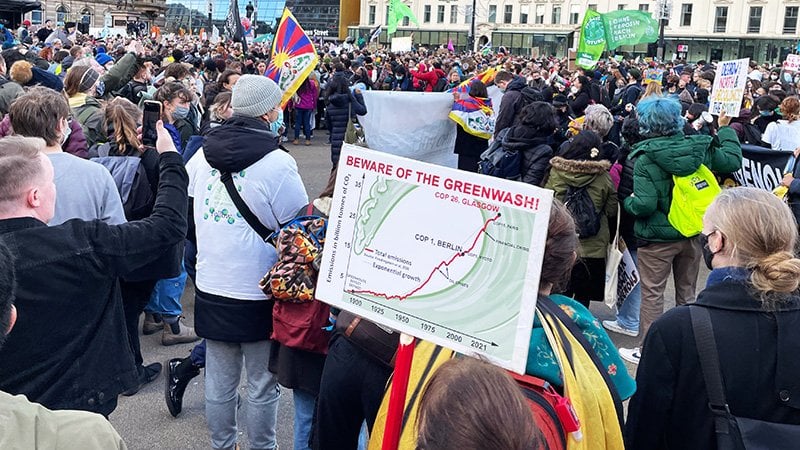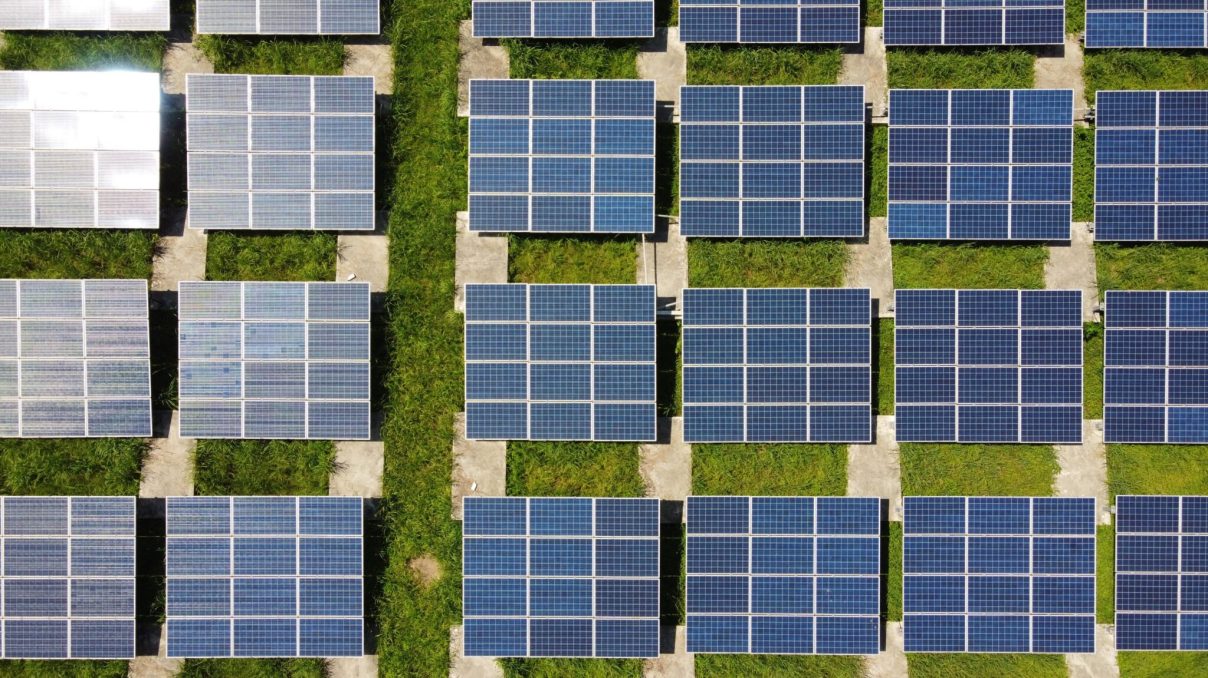GLASGOW, Scotland – The host city for the UN’s COP26 climate conference was on fire last week—metaphorically speaking. After the wakeup call from COVID-19, the pressure was on to finally do something decisive about global warming, and the city was bursting with energy, ideas, and great expectations.
The world’s leaders and climate conference delegates gathered in this post-industrial city flanking the River Clyde to negotiate agreements and announce new initiatives. Meanwhile, a host of executives from corporations large and small were on hand to boost their Green cred as tens of thousands of people protested in the streets. Seemingly everywhere I walked in the city there was some sort of climate-related activity.

In a city park, I saw about 20 5- or 6-year-olds participating in a climate-education program. They were wearing yellow t-shirts with the word “Disruptor” on their backs.
There was a lot of divergent messaging going on, but, to me, the most important signal I picked up was the shift in attitudes of young people. They are paying attention and they are pissed off. Business leaders would be smart to heed them.
I had a privileged vantage point from which to draw this conclusion. In addition to my duties as a correspondent for Techonomy.com and other media organizations, I led a small team from Pivot Projects, a global voluntary problem-solving group, to make two short videos capturing the voices of young people. We asked them two open-ended questions: 1) What is your dream of a more sustainable future and 2) What are you doing about it?
You can watch the finished videos here.
Of course, the climate movement has been something of a children’s crusade ever since teenage climate activist/icon Greta Thunberg in 2018 launched her famous “School-strike for Climate” protests, also known as “Fridays for Future.” Those weekly student “strikes” spread like TikTok amongst school children around the world. And during the first week of the two-week COP26 conference, there were plenty of young people in the mass protests that happened just about every day, too.

But what was particularly interesting about the 40-plus young people my video team interviewed was that while a handful were card-carrying climate activists, most were not. They were university and high school students, young professionals, and regular folks—including a barista and a restaurant dishwasher. Many of them, unprompted, voiced skepticism about the world’s bosses—both political and commercial. They called for businesses to step up and take aggressive action to reduce their carbon footprints, and they decried the thirst for profits at all costs that they said seems to drive many business leaders.

For example, Ewan Scholefield, an electrical and mechanical engineering major at University of Strathclyde, told us, “There’s a lot of waste and inefficiency in our system for the sake of profit. Also, more people are interested in appearing like they care about climate change than actually doing something about it.”
A design student said corporations should be “forced” to toe the environment line.
Capitalists have enjoyed a smooth ride since the collapse of the Soviet system left them without an alternative world economic view to grind against. Meanwhile, wealth is increasingly concentrated in the hands of a relative few, as a duo of media giants (Fox News and Facebook) control/poison minds on a mass scale, and a handful of tech behemoths (Amazon, Google, Apple, Netflix, etc.) control great swaths of commerce. Many regular people feel ignored, abused, or left out. I’m not suggesting I see an incipient mass uprising against capitalism, but cracks are appearing in the hegemony that modern capitalism—with its profits-at-all-costs ethic—has commanded for more than three decades.
The neoliberal embrace of unbridled capitalism—the idea that the sole task of leaders of publicly-traded corporations is to maximize profit—has enjoyed mass fealty since Ronald Reagan and Margaret Thatcher in the 1980s declared war on labor unions and preached that businesses can do a better job of managing society than can government leaders. But we have seen how institutions and ideas with apparently unassailable dominance have cracked and teetered. (Think the music industry pre- and post-iPod). “When an industry gets disrupted, it is the most dominant players, blinded by their success, that are the last to see it coming,” says my friend Damian Costello, an Irish disruptive-innovation consultant.
Today, young people are demanding that corporations put saving the planet before profits. Will corporate bosses listen? Clearly, some have their ear to the rails. Patagonia, the outdoor retailer, has long been committed to environmental sustainability; and Salesforce, the cloud computing giant, recently made a splash with its announcement that it is already carbon-neutral on an operating basis. But the pledges of many large corporations strike me—and young people we interviewed—as highly suspect.
Businesses that don’t operate sustainably risk losing young people as customers, but they also risk missing out on some of the best and brightest employees—those who insist that the organizations they work for must play a positive social role. For instance, 30,000 young people in France have already signed the Ecological Awakening pledge. “Unless they change, companies will not be able to attract the young talent they need,” says Peter Head, chairman of Resilience Brokers, a non-profit sustainability consultancy.
We stand at a crossroads. If business leaders make aggressive efforts to operate more sustainably, we have a chance to prevent temperatures from rising 1.5 degrees Celsius above pre-industrial levels and to avoid global calamity and mass extinctions. Today’s young people will likely be alive when the first wave of even-worse climate disasters comes. The corporations that drag their feet may find they will not be forgiven, their treasured “brand equity” greatly devalued.
So, capitalists beware: today’s 6-year-olds wearing “Disruptor” t-shirts may come to get you, or turn their backs on you.
—
Steve Hamm is a freelance writer and documentary filmmaker based in New Haven, Connecticut, USA. His new book, The Pivot: Addressing Global Problems Through Local Action, about the journey of Pivot Projects, was published in October by Columbia University Press. This is one of a series of dispatches from COP26 for Techonomy.
Read more from Steve Hamm’s COP26 Dispatches
October 29th: COP26: Let’s Pivot to Save the Planet
November 1: SustainChain: a Collaboration Platform for Do-Gooders
November 3: How Oil-Rich Aberdeen is Pivoting Away from Fossil Fuels
November 5: Glasgow Dispatch: Startup Funding Encourages Sustainability
November 8: Can Better Town-Gown Relations Help Save the Planet?






